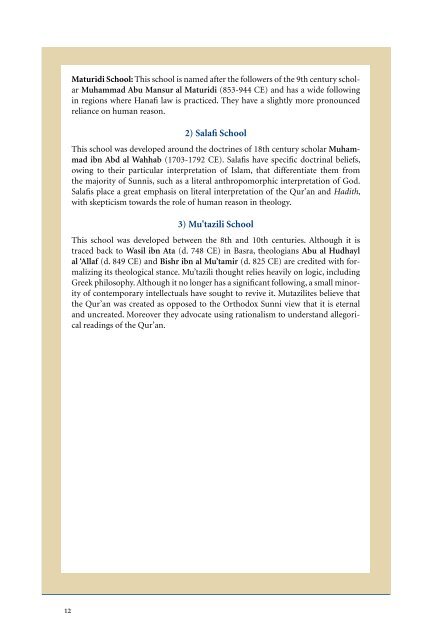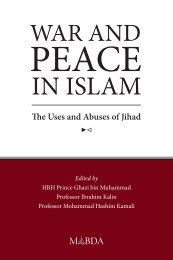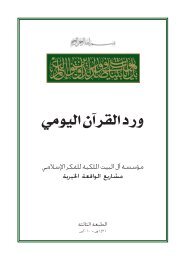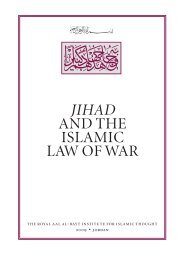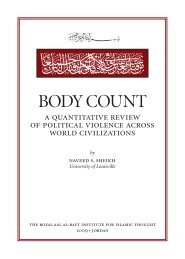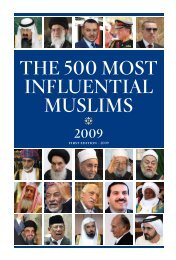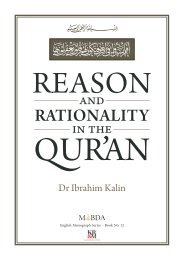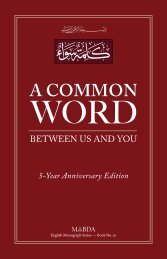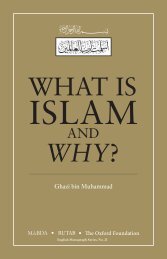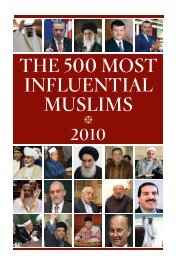- Page 1: the 500 most influential muslims =
- Page 4 and 5: Chief Editors Prof John Esposito an
- Page 6 and 7: contents 10. Science and Technology
- Page 8 and 9: 2 demography of influence Influence
- Page 11 and 12: the diversity of islam = i. the hou
- Page 13 and 14: exceeding whiteness and whose hair
- Page 15 and 16: Asbab al Nuzul); then the eight tra
- Page 17: ii. major doctrinal divisions withi
- Page 21 and 22: IIIa. traditional islam (continued)
- Page 23: IIIb. islamic fundamentalism muslim
- Page 26 and 27: 20 13. Hodjaefendi Fethullah Gülle
- Page 28 and 29: King Abdullah bin 'Abd al 'Aziz al
- Page 30: Grand Ayatollah Khamenei is the Sup
- Page 34: 4 his Majesty king abdullah ii bin
- Page 38 and 39: 6 his Majesty sultan Qaboos bin sa'
- Page 40 and 41: Grand Ayatollah Sayyid Ali Husseini
- Page 42: Sheikh Muhammad Sayyid Tantawi is t
- Page 46: Sheikh Ali Goma'a is the Grand Muft
- Page 50: Mohammad Mahdi Akef became Supreme
- Page 53 and 54: Photo property of The Royal Islamic
- Page 56 and 57: Leader of the Pakistan chapter of t
- Page 58: Amirul Mu'minin Sheikh as Sultan Mu
- Page 62: Dr KH Achmad Hasyim Muzadi is the l
- Page 65 and 66: Screenshot from MBC website 59
- Page 68:
As prime minister and vice presiden
- Page 72 and 73:
Sheikh Bouti is the leading Islamic
- Page 74:
24 his Majesty sultan haji hassanal
- Page 77 and 78:
Copyright unknown 71
- Page 79 and 80:
28 HIS ExCELLENCY ABDULLAH GüL Pre
- Page 81 and 82:
32 SHEIKH AHMAD TIJANI ALI CISSE Le
- Page 83 and 84:
36 MAULANA MAHMOOD MADANI Secretary
- Page 85 and 86:
40 HIS ExCELLENCY PROFESSOR DR EKME
- Page 87 and 88:
44 PROFESSOR SAYID AMEEN MIAN QAUDR
- Page 89 and 90:
48 ABDULLAH 'AA GYM' GYMNASTIAR Ind
- Page 91 and 92:
honoraBle mention = The following 1
- Page 93 and 94:
the lists = 87
- Page 95 and 96:
Philanthropy p.135 These philanthro
- Page 97 and 98:
SCHOLARLY IRAN amoli, his eminence
- Page 99 and 100:
SCHOLARLY MOROCCO azzouzi, prof. dr
- Page 101 and 102:
SCHOLARLY SOUTH AFRICA hendricks, s
- Page 103 and 104:
SCHOLARLY INDONESIA azra, azyumardi
- Page 105 and 106:
SCHOLARLY of Muslims with North Afr
- Page 107 and 108:
SCHOLARLY UNITED STATES abou el fad
- Page 109 and 110:
POLITICAL MIDDLE EAST AND NORTH AFR
- Page 111 and 112:
POLITICAL LIBYAN ARAB JAMAHIRIYA ga
- Page 113 and 114:
POLITICAL NIGERIA yar’adua, his e
- Page 115 and 116:
POLITICAL Berdimuhamedow visited Is
- Page 117 and 118:
POLITICAL UNITED KINGDOM malik, sha
- Page 119 and 120:
ADMINISTRATIvE free education avail
- Page 121 and 122:
ADMINISTRATIvE NIGERIA ajibola, his
- Page 123 and 124:
ADMINISTRATIvE INDONESIA umar, dr n
- Page 125 and 126:
ADMINISTRATIvE ICELAND tamimi, salm
- Page 127 and 128:
ADMINISTRATIvE OCEANIA NEW ZEALAND
- Page 129 and 130:
LINEAGE MIDDLE EAST AND NORTH AFRIC
- Page 131 and 132:
PREACHERS ASIA INDIA naik, zakir ab
- Page 133 and 134:
WOMEN MOROCCO yassine, nadia Nadia
- Page 135 and 136:
WOMEN BANGLADESH wazed, her excelle
- Page 137 and 138:
WOMEN UNITED KINGDOM janmohamed, sh
- Page 139 and 140:
YOUTH MIDDLE EAST AND NORTH AFRICA
- Page 141 and 142:
PHILANTHROPY MIDDLE EAST AND NORTH
- Page 143 and 144:
DEvELOPMENT MIDDLE EAST AND NORTH A
- Page 145 and 146:
DEvELOPMENT UNITED ARAB EMIRATES al
- Page 147 and 148:
DEvELOPMENT SOUTH AFRICA jeenah, na
- Page 149 and 150:
DEvELOPMENT 450 published works and
- Page 151 and 152:
DEvELOPMENT chief diversity adviser
- Page 153 and 154:
DEvELOPMENT UNITED STATES omar, man
- Page 155 and 156:
SCIENCE AND TECHNOLOGY EUROPE FINLA
- Page 157 and 158:
ARTS AND CULTURE WEST AFRICA MALI k
- Page 159 and 160:
ARTS AND CULTURE EUROPE DENMARK bac
- Page 161 and 162:
ARTS AND CULTURE chappelle, dave Da
- Page 163 and 164:
ARTS AND CULTURE SAUDI ARABIA al mu
- Page 165 and 166:
MEDIA PALESTINE khanfar, waddah Kha
- Page 167 and 168:
MEDIA UNITED KINGDOM nahdi, fuad Fu
- Page 169 and 170:
RADICALS MIDDLE EAST AND NORTH AFRI
- Page 171 and 172:
INTERNATIONAL ISLAMIC NETWORKS This
- Page 173 and 174:
ISSUES OF THE DAY This list include
- Page 175:
ISSUES OF THE DAY YOUTH UNEMPLOYMEN
- Page 178 and 179:
Al Fatiha: Meaning 'the opening', t
- Page 180 and 181:
Ramadan: Holy month of fasting. Sal
- Page 182 and 183:
Kazakhstan 176 Kyrgyzstan Uzbekista
- Page 184 and 185:
Region Country Population 178 Islam
- Page 186 and 187:
Region Country Population 180 Islam
- Page 188 and 189:
Region Country Population Eastern E
- Page 191 and 192:
index Country Name Page Afghanistan
- Page 193 and 194:
Country Name Page Egypt (23) Abdelk
- Page 195 and 196:
Country Name Page Iran Taskhiri, H.
- Page 197 and 198:
Country Name Page Nigeria Adegbite,
- Page 199 and 200:
Country Name Page South Africa Moos
- Page 201 and 202:
Country Name Page United States Abd
- Page 204 and 205:
198 note on format • All dates ar


